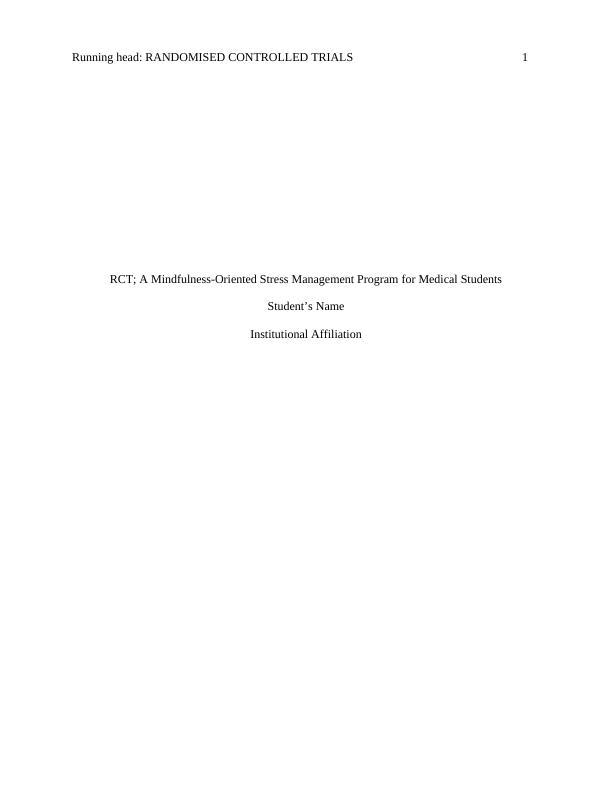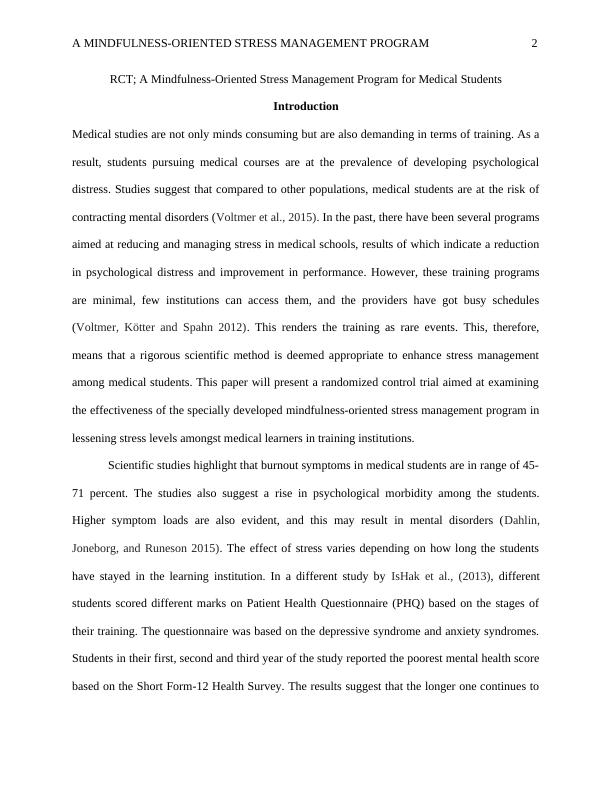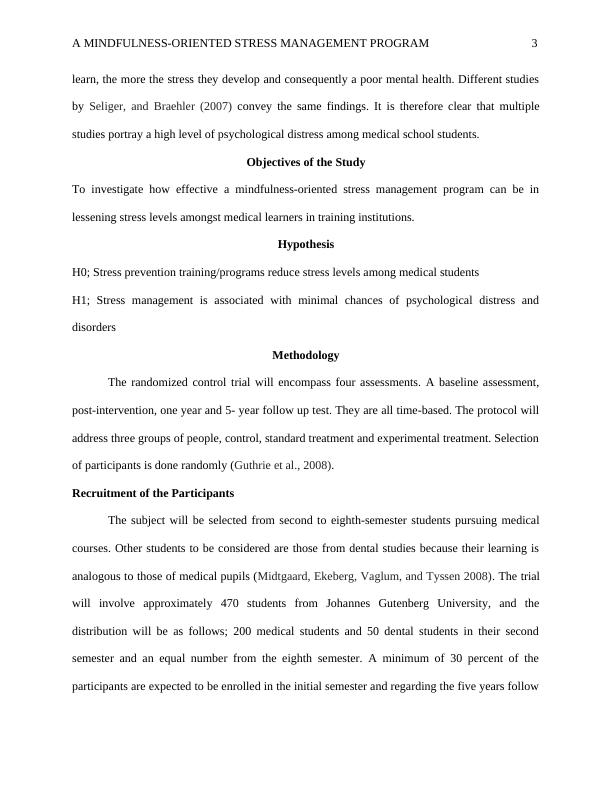RCT; A Mindfulness-Oriented Stress Management Program for Medical Students
Added on 2023-06-11
7 Pages1937 Words315 Views
Running head: RANDOMISED CONTROLLED TRIALS 1
RCT; A Mindfulness-Oriented Stress Management Program for Medical Students
Student’s Name
Institutional Affiliation
RCT; A Mindfulness-Oriented Stress Management Program for Medical Students
Student’s Name
Institutional Affiliation

A MINDFULNESS-ORIENTED STRESS MANAGEMENT PROGRAM 2
RCT; A Mindfulness-Oriented Stress Management Program for Medical Students
Introduction
Medical studies are not only minds consuming but are also demanding in terms of training. As a
result, students pursuing medical courses are at the prevalence of developing psychological
distress. Studies suggest that compared to other populations, medical students are at the risk of
contracting mental disorders (Voltmer et al., 2015). In the past, there have been several programs
aimed at reducing and managing stress in medical schools, results of which indicate a reduction
in psychological distress and improvement in performance. However, these training programs
are minimal, few institutions can access them, and the providers have got busy schedules
(Voltmer, Kötter and Spahn 2012). This renders the training as rare events. This, therefore,
means that a rigorous scientific method is deemed appropriate to enhance stress management
among medical students. This paper will present a randomized control trial aimed at examining
the effectiveness of the specially developed mindfulness-oriented stress management program in
lessening stress levels amongst medical learners in training institutions.
Scientific studies highlight that burnout symptoms in medical students are in range of 45-
71 percent. The studies also suggest a rise in psychological morbidity among the students.
Higher symptom loads are also evident, and this may result in mental disorders (Dahlin,
Joneborg, and Runeson 2015). The effect of stress varies depending on how long the students
have stayed in the learning institution. In a different study by IsHak et al., (2013), different
students scored different marks on Patient Health Questionnaire (PHQ) based on the stages of
their training. The questionnaire was based on the depressive syndrome and anxiety syndromes.
Students in their first, second and third year of the study reported the poorest mental health score
based on the Short Form-12 Health Survey. The results suggest that the longer one continues to
RCT; A Mindfulness-Oriented Stress Management Program for Medical Students
Introduction
Medical studies are not only minds consuming but are also demanding in terms of training. As a
result, students pursuing medical courses are at the prevalence of developing psychological
distress. Studies suggest that compared to other populations, medical students are at the risk of
contracting mental disorders (Voltmer et al., 2015). In the past, there have been several programs
aimed at reducing and managing stress in medical schools, results of which indicate a reduction
in psychological distress and improvement in performance. However, these training programs
are minimal, few institutions can access them, and the providers have got busy schedules
(Voltmer, Kötter and Spahn 2012). This renders the training as rare events. This, therefore,
means that a rigorous scientific method is deemed appropriate to enhance stress management
among medical students. This paper will present a randomized control trial aimed at examining
the effectiveness of the specially developed mindfulness-oriented stress management program in
lessening stress levels amongst medical learners in training institutions.
Scientific studies highlight that burnout symptoms in medical students are in range of 45-
71 percent. The studies also suggest a rise in psychological morbidity among the students.
Higher symptom loads are also evident, and this may result in mental disorders (Dahlin,
Joneborg, and Runeson 2015). The effect of stress varies depending on how long the students
have stayed in the learning institution. In a different study by IsHak et al., (2013), different
students scored different marks on Patient Health Questionnaire (PHQ) based on the stages of
their training. The questionnaire was based on the depressive syndrome and anxiety syndromes.
Students in their first, second and third year of the study reported the poorest mental health score
based on the Short Form-12 Health Survey. The results suggest that the longer one continues to

A MINDFULNESS-ORIENTED STRESS MANAGEMENT PROGRAM 3
learn, the more the stress they develop and consequently a poor mental health. Different studies
by Seliger, and Braehler (2007) convey the same findings. It is therefore clear that multiple
studies portray a high level of psychological distress among medical school students.
Objectives of the Study
To investigate how effective a mindfulness-oriented stress management program can be in
lessening stress levels amongst medical learners in training institutions.
Hypothesis
H0; Stress prevention training/programs reduce stress levels among medical students
H1; Stress management is associated with minimal chances of psychological distress and
disorders
Methodology
The randomized control trial will encompass four assessments. A baseline assessment,
post-intervention, one year and 5- year follow up test. They are all time-based. The protocol will
address three groups of people, control, standard treatment and experimental treatment. Selection
of participants is done randomly (Guthrie et al., 2008).
Recruitment of the Participants
The subject will be selected from second to eighth-semester students pursuing medical
courses. Other students to be considered are those from dental studies because their learning is
analogous to those of medical pupils (Midtgaard, Ekeberg, Vaglum, and Tyssen 2008). The trial
will involve approximately 470 students from Johannes Gutenberg University, and the
distribution will be as follows; 200 medical students and 50 dental students in their second
semester and an equal number from the eighth semester. A minimum of 30 percent of the
participants are expected to be enrolled in the initial semester and regarding the five years follow
learn, the more the stress they develop and consequently a poor mental health. Different studies
by Seliger, and Braehler (2007) convey the same findings. It is therefore clear that multiple
studies portray a high level of psychological distress among medical school students.
Objectives of the Study
To investigate how effective a mindfulness-oriented stress management program can be in
lessening stress levels amongst medical learners in training institutions.
Hypothesis
H0; Stress prevention training/programs reduce stress levels among medical students
H1; Stress management is associated with minimal chances of psychological distress and
disorders
Methodology
The randomized control trial will encompass four assessments. A baseline assessment,
post-intervention, one year and 5- year follow up test. They are all time-based. The protocol will
address three groups of people, control, standard treatment and experimental treatment. Selection
of participants is done randomly (Guthrie et al., 2008).
Recruitment of the Participants
The subject will be selected from second to eighth-semester students pursuing medical
courses. Other students to be considered are those from dental studies because their learning is
analogous to those of medical pupils (Midtgaard, Ekeberg, Vaglum, and Tyssen 2008). The trial
will involve approximately 470 students from Johannes Gutenberg University, and the
distribution will be as follows; 200 medical students and 50 dental students in their second
semester and an equal number from the eighth semester. A minimum of 30 percent of the
participants are expected to be enrolled in the initial semester and regarding the five years follow

End of preview
Want to access all the pages? Upload your documents or become a member.
Related Documents
Post Traumatic Stress Disorder Research Paper Outlinelg...
|7
|1163
|115
Assignment on Research in Education.lg...
|3
|421
|25
Evidence-Based Research on Stress Management and Mindfulness Program for Nursing Studentslg...
|16
|3513
|58
Psychology - Impact of Physical Exerciselg...
|8
|2546
|32
Screening for Symptoms of Postpartum Traumatic Stress in Mothers with Preterm Infantslg...
|10
|8203
|134
Assignment on Critical Review and Analysis of Three Mind-body Therapieslg...
|8
|1904
|96
